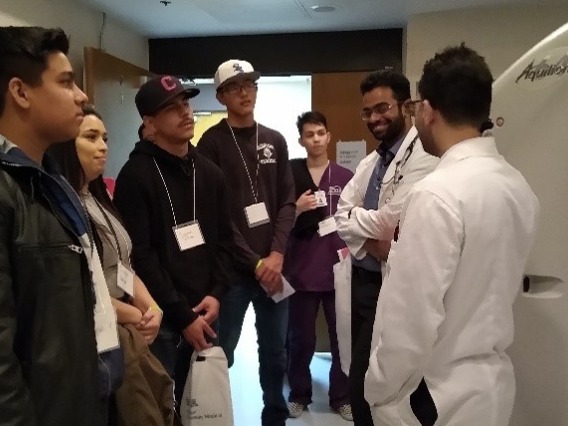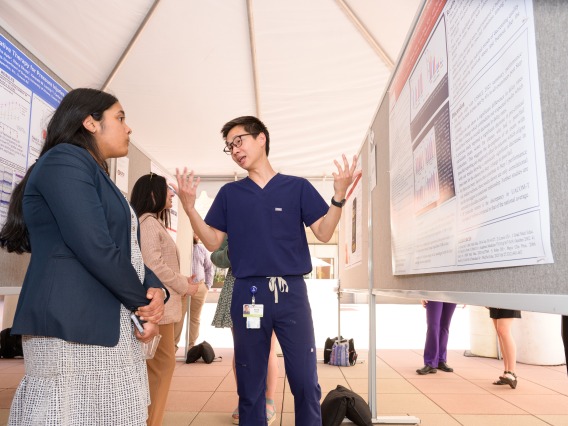With the full support from the ABOR and COM-T, the GME mission is to support our educational programs that train residents and fellows in the medical specialties and subspecialties. In alignment with the ACGME “Quadruple Aim” we are dedicated to the development of a physician workforce that ultimately serves the public by striving to improve the clinician and patient experience, improve patient outcomes, and minimize health care costs. We uphold a training environment that fosters each resident’s and fellow’s professional and personal goals in clinical care, research, teaching, service and advocacy. We support our programs’ use of modern educational methodologies that are evidence- and competency-based, using validated methods of assessment to promote the development of physician competencies to deliver compassionate, ethical, safe and, ultimately, independent clinical care. We maintain a clinical learning environment that ensures the physical and psychological safety of our patients and trainees in an environment that promotes educational inquiry. We ensure all members of the health care team can work and raise concerns without fear of retaliation, and an atmosphere that promotes the development and well-being of our trainees in habits of life-long learning and self-care. We value and foster the delivery of safe, high-quality clinical care, and encourage efforts to understand and mitigate health care costs, improve health equity, and decrease health care disparities both broadly and in our community. We are committed to seek, recruit and train a diverse group of residents and fellows who fulfill our mission, and who will provide compassionate and culturally informed care to our diverse population in Arizona and beyond.

|

|
 |
Unpublished on Legacy Hub - Do we need to migrate it? https://internal.resources.medicine.arizona.edu/education/graduate/grad…
Current Residents and Fellows
Support and Services
- Steps to Initiate and Update National Provider Identifier
- AAMC Financial Information, Resources and Tools (FIRST)
- New Innovations
- UA Office of International Faculty and Scholars
Organizations
- American Board of Medical Specialties (ABME)
- American Medical Association (AMA)
- Arizona Board of Osteopathic Examiners
- Arizona Medical Association
- Arizona Medical Board
- Centers for Medicare and Medicaid Services (CMS)
- Education Commission for Foreign Medical Graduates (ECFMG)
- Federation of State Medical Boards
- Pima Medical Society
- United States Medical Licensing Examination (USMLE)
2023 Fall Resident and Fellow Research Scholarship
GME is pleased to announce a call for applications for our 2023 Fall Resident and Fellow Research Scholarships. These scholarships are aimed at any resident or fellow who has the potential to become a future leader in their chosen field. All applicants must be nominated by their program director. The College of Medicine – Tucson Office of Graduate Medical Education will identify residents or fellows with a proven track record of excellence and demonstrate potential to become future academic leaders in their chosen field. To further promote the career of these physicians-in-training, the GME office will provide support to encourage career-enhancing opportunities and experiences during their residency/fellowship training. Funding may support pursuing an original research proposal (particularly if done in collaboration with a faculty mentor) or, with compelling reasons, participation at a national conference, research-related training, or a unique experience.
The deadline for submission was November 1, 2023.
Deans Scholarships for Residents and Fellows
Residents and fellows pursuing coursework at the University of Arizona can apply for up to $10,000 in scholarship funding. This program is intended to assist physicians pursuing educational coursework and residency training. Awardees can receive up to $5,000 per semester for a maximum of $10,000 award. Applicants must be employed by Banner Health and pursuing coursework (online or traditional) at the University of Arizona. Their employment must be expected to continue for six months or more at the time of application. The Dean’s Scholarship for Residents and Fellows is a competitive scholarship. Preference will be given to applicants enrolled in UA Health Sciences courses directly aligned with their professional career goals. Applicants will be asked to describe how the course(s) will further their career goals. For more information about the application process, contact the GME office at com-gme@arizona.edu
Trainees participate in a Graduate Medical Education (GME) program sponsored by the University of Arizona College of Medicine – Tucson or College of Medicine – Phoenix. While participating in the training program, trainees are employed by Banner – University Medical Group (B-UMG) and are afforded the opportunity to practice medicine under specified conditions for a designated period of time.
While participating in a training program, trainees are afforded the procedural rights described in the file below.
Professional liability insurance is covered by Banner Health for the duration of their residency/fellowship. Please complete Banner Request for Claims History and Malpractice Insurance form and mail to the address on the form. For claim verifications for University of Arizona residents and fellows prior to July 1, 2016, please email specific request and attach the University of Arizona Authorization to release form to gme@medadmin.arizona.edu.
Training verifications are done at the program level, please see the list below for contacts by specialty.
Program contact list March 2024: https://internal.resources.medicine.arizona.edu/sites/default/files/pro…
Residents and fellows are important in the development and education of medical students and their participation at all of our partner institutions is valued deeply.
Clerkships
Residents and fellows must be familiar with the College of Medicine – Tucson specific clerkship learning objectives. These can be found in the syllabus for each clerkship listed below.
- Ambulatory Medicine
- Medicine Inpatient
- Neurology
- Obstetrics & Gynecology
- Pediatric
- Psychiatry
- Surgery
- Family & Community Medicine
- Integrated Emergency Medicine & Critical Care
All clerkship syllabuses were updated March 1, 2024.
Development of Resident Teaching Skills
Residents benefit from additional instruction on how best to teach students. This is addressed at the College of Medicine – Tucson in several different ways:
- In-person sessions sponsored by the College of Medicine – Tucson onsite or elsewhere at other teaching sites
- Sessions that exist as part of their residency program curriculum. Residency programs submit this information annually so the college can assure that all residents are receiving training
- College of Medicine – Tucson web-based residents as educators training is provided each year during onboarding and when residents/fellows advance each year
Resident and Fellow Academic Support
Individual Appointments for Residents and Fellows For:
- In-Training Exams
- Specialty and Subspeciality Board Exams
- USMLE Step 3/COMLEX-USA Level 3
- Test Taking Strategies
- Retention Challenges
- Learning Strategies
- Study Schedules
- Pre-Rounding Efficiency
- Time Management and Efficiency Issues (for studying)
- Integrating Feedback and Effectively Asking for Feedback
Schedule an appointment with RoseMarie Smith, learning specialist.
Workshop Topics Available for Request:
- Creating a Personalized Study Plan for Board Studying (Specialty or Subspecialty Specific Requests)
- Setting Realistic Study Goals for Your ITE and Beyond
- Myths of Learning Styles and Tips for Learning
- Strategies for Using a Question Bank
- Learning Strategies and Test Taking Tips
- Learning Strategies/ Recommendations for Professional Reading
- Effectively Asking for Feedback
- Utilizing Feedback
- Other workshops available upon request
Program directors, program administrators and chief residents can request a workshop please e-mail the GME learning specialist directly.
USMLE Step 3 is the final exam in the USMLE sequence. USMLE Step 3 is different than previous USMLE exams you have taken. First and foremost, this exam is divided into two separate days and the second day includes not only multiple-choice questions but also case simulations. Additionally, you are now in residency and do not have dedicated time to study for this exam and will need to adopt a tailored approach for studying for this specific exam.
The first step to take in preparing for Step 3 is to develop a timeline of when you will take the exam and how much time you have to prepare. Most residents end up using these three resources to study for Step 3: UWorld Question Bank, Master the Boards USMLE Step 3, and OnlineMedEd. OnlineMedEd is free and contains many high-yield videos. Typically for Step 3, the intern contact is valuable as well as the corresponding subjects that are not covered in the intern’s specialty. For example, pediatric residents can benefit from a cardiology refresher video.
If you would like further assistance on Step 3 and how you might create a study plan, please make an appointment with the GME Learning Specialist RoseMarie Smith.
For more information on the content and formatting of the exam, visit the USMLE Step 3 webpage. To take Step 3, you need to submit an application on the Federation of State Medical Boards.
COMLEX-USA Level 3 is the final exam in the COMLEX sequence. Candidates take COMLEX Level 3 after graduating from their doctor of osteopathic school. COMLEX Level 3 is different than previous COMLEX exams you have taken. This exam is the most challenging and takes two separate days to complete. There are multiple choice questions and also clinical decision-making cases. Additionally, you are now in residency and do not have dedicated time to study for this exam and will need to adopt a tailored approach for studying for this specific exam.
The first step to take in preparing for COMLEX Level 3 is to develop a timeline of when you will take the exam and how much time you have to prepare. Residents usually use one of two questions banks, either COMBANK from TrueLearn or COMQUEST. Then they also use an osteopathic medicine book such as OMT Review: A Comprehensive Review in Osteopathic Medicine. One advantage of selecting to use COMBANK (from TrueLearn) is you can add a predictive assessment exam to your question bank for an additional fee.
If you need to refresh your memory on certain topics you might want to check out OnlineMedEd. This resource is free and contains many high-yield videos. Typically for Step 3, the intern contact is valuable as well as the corresponding subjects that are not covered in the intern’s specialty. For example, pediatric residents can benefit from a cardiology refresher video.
If you would like further assistance on COMLEX Level 3 and how you might create a study plan, please make an appointment with the GME Learning Specialist RoseMarie Smith.
For more information on the content, exam format and registration visit the NBOME webpage.
As you embark on searching for an attending position after residency or are applying to a fellowship, you want a well-polished curriculum vitae and to be ready for interviewing at any time.
Cover Letter Tips
Not all jobs require a cover letter but when they do, a well-written cover letter can help you stand out from the other applicants. Your goal in a cover letter is to prove you are exactly what the employer is looking for and you want to answer these three questions:
- Why are you interested in the position?
- How are you qualified for the position?
- Why are you a good fit for this position?
Curriculum Vitae (CV) Tips
A curriculum vitae is meant to document your entire academic history and work history. Here are few tips:
- Include your name, credential, specialty or subspecialty, and contact information in your heading
- To make your application more cohesive, use the same font type on all parts of your CV, as well as your cover letter, research statement, reference list, etc.
- Provide your name in a footer or header on every page of your CV, as well as other application materials
- Do not include your SSN, age, gender, race, religion, political affiliation, marital/parental status, disability or national origin, or DEA numbers
Learn more from the AAMC and the AMA.
Interviewing Tips
- Dress accordingly: Interviews are formal, so you should be too.
- Do your research on the fellowship or hospital, department and division you are applying to. Use the webpages and see if you can find any specific strengths, weaknesses or unique aspects. This shows the program or place you are interviewing with that you have done your homework.
- Avoid generic answers for questions. Instead, make an impression and give succinct answers with examples.
- Practice, practice, practice: Practice alone or with someone else, which will reduce embarrassment, help refine your answers, and help you be far more relaxed on interview day.
- Prepare questions ahead of time: Asking questions shows your interest in the fellowship or position you are applying for.
- Show gratitude by sending a thank you note: It is appropriate to send a thank you email after interviewing within 24 hours. A thank you note should include key parts to your conversation, reiterate interest in the program or position, and invite a request for additional information or follow-up.
Is there a cost for these services?
All appointments are provided free of charge to all residents and fellows.
Who would benefit from the services offered?
Residents and fellows visit for a variety of reasons: learning more efficient ways of studying, developing an effective study plan, exploring test-taking strategies, editing a statement for a fellowship, figuring out pre-rounding strategies, and more. Regardless of why you would like to meet, any resident or fellow is welcome to make an appointment.
Do I need to know what type of assistance to request before visiting?
It is helpful to have a general idea of what you would like to focus on (study plan for an in-training exam, pre-rounding efficiency, etc.). During our first meeting, I will ask about your background and together we will discuss your past and current strategies for learning and other information as relevant. Finally, we will get into why you made the appointment in the first place. It is always a good idea to know what you are hoping to take away from the appointment.
I had accommodations in medical school. Who do I contact to see about accommodations in residency?
Accommodations are not handled by the GME learning specialist. Instead, there is a specific process to follow for accommodations depending on what type of accommodations you are seeking. Some accommodation requests are handled through the Disability Resource Center at the University of Arizona. Please reach out to the appropriate contact below depending on the accommodation you are seeking.
Cheryl Muller (in-service exam accommodations)
Senior Associate Director
mullerc@email.arizona.edu
520-621-9170
Workplace Access (workplace accommodations)
workplaceaccess@email.arizona.edu
520-626-9559
Are the sessions confidential?
Most appointments are voluntary and stay between you and the GME learning specialist. However, in some situations if your program required you to make a meeting (e.g., for an ITE referral), meeting dates, a general summary of the meeting, and recommendations will be shared with program personnel. If there is something you would not like shared with your program, be sure to let the GME learning specialist know when you meet.
How do I book an appointment?
Contact RoseMarie Smith at psychedintegrated@gmail.com
What happens if I cannot make the appointment I scheduled?
Please notify RoseMarie Smith at psychedintegrated@gmail.com if you will be late or need to cancel or reschedule your appointment. Twenty-four-hour notice of cancellation allows us to use the time for other residents or fellows in need.
Graduate Medical Education
GME Announcements
Quick Links
Contact GME
520-626-????
com-gme@arizona.edu







